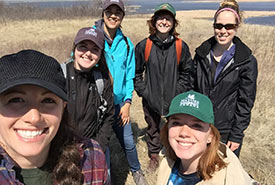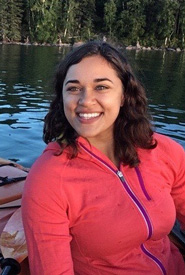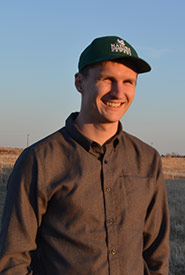Summer intern interviews: Meet the fresh faces of NCC's Saskatchewan region (Part one)

Summer interns of NCC's Saskatchewan region (Photo by NCC)
Every summer, the Nature Conservancy of Canada (NCC) hires students from across the country to work in its summer intern program. The students help complete valuable conservation and fundraising work during their time here. They are also the future of conservation ― the future leaders who will push conservation to new levels in the decades to come.
We thought you would like to get to know two of our summer interns from NCC’s Saskatchewan Region. Read my interviews below:
Elan Marsall

Elan Marsall (Photo courtesy of Elan Marsall)
Elan grew up in Pilot Butte, Saskatchewan, and now studies at Lakeland College in Vermillion, Alberta.
LS: Where do you go to school and what did you study?
EM: I am going into my second year of environmental sciences at Lakeland College. I am specializing in the conservation side of environmental sciences. I was happy to learn that many of my new colleagues at NCC are Lakeland graduates. As a student, it is great to hear that people with my degree are working in the types of careers I see myself pursuing in the future.
LS: What led you to conservation?
EM: I have always loved being outside and enjoying nature, but when I started to learn about endangered species I wanted to be part of the solution and not the problem. We have already lost so much biodiversity that I really wanted to help save what we have left. I can’t see myself ever being as passionate for something as I am for the environment, and I want to work in a field that I am passionate about.
LS: What led you to NCC?
EM: I have known about NCC for a while, so when I was looking for a job in my field and I saw that NCC had a science education intern position, I jumped on it. It seemed like such a great opportunity to learn from senior NCC staff while also sharing the knowledge that I have gained at school.
LS: Do you have a favourite animal?
EM: I have always loved beavers. I just think they are cool. During the frontier trapping days, we lost so many to over-trapping. But they are a hardy species, and their numbers have rebounded. They are also a keystone species (a species that many other species rely on) that is so important to ecosystems. So many other species rely on beaver dams to provide their habitat because the dams create perfect ponds for many animals, even massive animals like moose.
LS: Do you have a favourite plant?
EM: I will always have fond memories of trembling aspen. They were plentiful at my grandparent’s cabin, so I have many happy childhood memories running and hiding among them. I also like that, as trees go, they are small but they are also sturdy. It’s how I see myself: small and sturdy.
LS: If you could tell the world one thing, what would it be?
EM: I am a big fan of this quote from spoken word artist Prince Ea: “To betray nature is to betray us & to save nature is to save us because whatever you're fighting for ― racism or poverty, feminism, gay rights or any type of equality — it won't matter in the least because if we don't all work together to save the environment, we will be equally extinct.”
Breanna Silversides

Breanna Silversides
Breanna grew up in Brandon, Manitoba, and now attends the University of Regina in the environmental studies program, with a minor in GIS (geographic information system). This summer she is working as NCC’s GIS assistant in the Regina office.
LS: What led you to conservation?
BS: Growing up in Brandon, I spent much of my free time hiking and biking at the Brandon Hills. I was first introduced to conservation and land management when someone vandalized and cut down some trees in the wildlife management area. The group that managed the land jumped into action, scolding the vandalizer, fixing the damage and educating the public on proper use of the land. Before this happened, I just assumed no one owned the land or did anything with it. This was my first introduction to land management, which opened by eyes to the behind-the-scenes work that it takes to keep the wild remaining wild.
LS: What led you to the NCC?
BS: The loss of native prairie really worries me. Very few in the public know how damaged an ecosystem the plains have become. NCC is at the forefront of conserving native prairie, and I knew I wanted to be a part of that.
LS: Do you have a favourite plant?
BS: I love all prairie flowers. I get excited seeing them standing out against the prairie landscape. I also have a special place in my heart for pussy willows. As I child I would walk through my grandmother’s land collecting fallen pussy willow branches to take home. It is those types of memories that make me want to conserve nature, so that future generations can also have memories like that.
LS: What excites you about the future of conservation?
BS: I think it is exciting that we have the science and the resources to both conserve and restore damaged lands in Canada. We just have to make educated decisions on how to use technology to conserve the resources. I do think there is a slow shift in public sentiment toward conservation, which makes me excited to be a part of future conservation projects.
LS: What worries you about the future of conservation?
BS: While I do think that public sentiment toward conservation is improving, I worry that prairie and wetland ecosystems may get overlooked. Their role and importance hasn’t captured the public’s attention like other ecosystems around the world. However, conservation should be focused on maintaining biodiversity everywhere.
LS: If you could tell the world one thing, what would it be?
BS: Appreciate nature. If you truly appreciate something you will work harder to keep it intact. It is often only after nature is destroyed that we truly appreciate it, but by then it is too late.
The Conservation Internship Program is funded in part by the Government of Canada’s Summer Work Experience program.


